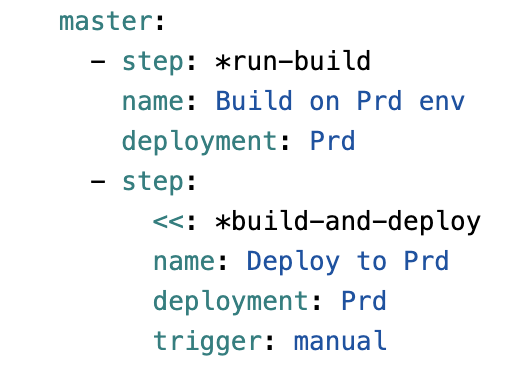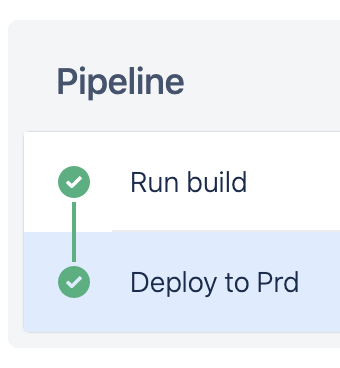I'm trying to get Bitbucket Pipelines to work with multiple steps that define the deployment area. When I do, I get the error
Configuration error The deployment environment 'Staging' in your bitbucket-pipelines.yml file occurs multiple times in the pipeline. Please refer to our documentation for valid environments and their ordering.
From what I read, the deployment variable has to happen on a step by step basis.
How would I set up this example pipelines file to not hit that error?
image: ubuntu:18.04
definitions:
steps:
- step: &build
name: npm-build
condition:
changesets:
includePaths:
# Only run npm if anything in the build directory was touched
- "build/**"
image: node:14.17.5
script:
- echo 'build initiated'
- cd build
- npm install
- npm run dev
- echo 'build complete'
artifacts:
- themes/factor/css/**
- themes/factor/js/**
- step: &deploychanges
name: Deploy_Changes
deployment: Staging
script:
- echo 'Installing server dependencies'
- apt-get update -q
- apt-get install -qy software-properties-common
- add-apt-repository -y ppa:git-ftp/ppa
- apt-get update -q
- apt-get install -qy git-ftp
- echo 'All dependencies installed'
- echo 'Transferring changes'
- git ftp init --user $FTP_USER --passwd $FTP_PASSWORD $FTP_ADDRESS push --force --changed-only -vv
- echo 'File transfer complete'
- step: &deploycompiled
name: Deploy_Compiled
deployment: Staging
condition:
changesets:
includePaths:
# Only run npm if anything in the build directory was touched
- "build/**"
script:
- echo 'Installing server dependencies'
- apt-get update -q
- apt-get install -qy software-properties-common
- add-apt-repository -y ppa:git-ftp/ppa
- apt-get update -q
- apt-get install -qy git-ftp
- echo 'All dependencies installed'
- echo 'Transferring compiled assets'
- git ftp init --user $FTP_USER --passwd $FTP_PASSWORD $FTP_ADDRESS push --all --syncroot themes/factor/css/ -vv
- git ftp init --user $FTP_USER --passwd $FTP_PASSWORD $FTP_ADDRESS push --all --syncroot themes/factor/js/ -vv
- echo 'File transfer complete'
pipelines:
branches:
master:
- step: *build
<<: *deploychanges
deployment: Production
- step:
<<: *deploycompiled
deployment: Production
dev:
- step: *build
- step: *deploychanges
- step: *deploycompiled


